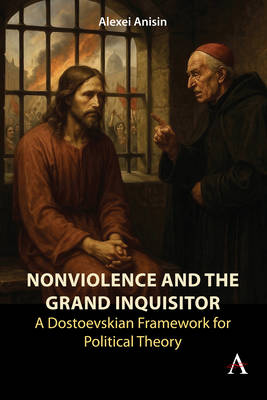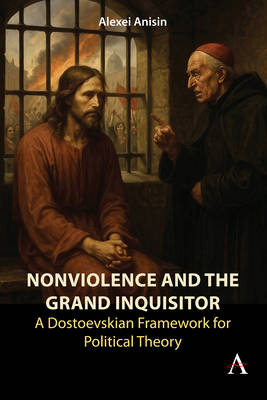
- Retrait gratuit dans votre magasin Club
- 7.000.000 titres dans notre catalogue
- Payer en toute sécurité
- Toujours un magasin près de chez vous
- Retrait gratuit dans votre magasin Club
- 7.000.0000 titres dans notre catalogue
- Payer en toute sécurité
- Toujours un magasin près de chez vous
Nonviolence and the Grand Inquisitor
A Dostoevskian Framework for Political Theory
Alexei AnisinDescription
Develops a new ethical framework for understanding nonviolence through Dostoevsky's "Legend of the Grand Inquisitor," bridging literature, philosophy, and activism with insights from thinkers like Gandhi, Zizek, and Judith Butler
In recent years, several high-profile academic outputs related to theory and ethics of nonviolence have emerged. This book adds to theoretical literature on nonviolence through developing a new framework based on concepts drawn from Dostoevsky's "Legend of the Grand Inquisitor" (LGI) which was originally articulated in the novel The Brothers Karamazov (1880). In doing so, this book accounts for a previously undetected ethical dimension of nonviolence. It repositions Dostoevsky as a vital contributor to theory on nonviolence and uncovers a philosophical stance that defines violence not through political revolution, but by spiritual resistance and self-reproach. This book accounts for principal findings that have been identified in empirical scholarship on nonviolence, and while doing so, it engages with classical political theorists and scholars on nonviolence, including Tolstoy, Gandhi, and Gene Sharp along with contemporary works including Zizek, Atack, Christoyannopoulos, and Butler.This book contributes a new framework to assess the ethical motivations behind nonviolence and its empirical efficacy based on concepts drawn from Dostoevsky's parable. The analysis of LGI offers an innovative explanation of the historical role of nonviolence and presents new implications for interpreting the efficacy of nonviolence in the contemporary world. Scholars have described the Grand Inquisitor as being representative of an evolution toward a totalitarian state, and it has even been acknowledged that the Grand Inquisitor was an inspiration for several key dystopian works that came afterwards such as Zamiatin's We (1921), Huxley's Brave New World (1932), and Orwell's Nineteen Eighty-Four (1949). Yet with great scholarly and literary emphasis having been placed on the authoritarian symbols of this parable, the LGI contains an under-studied component of nonviolence which, to date, is yet to be identified and theorized.
Spécifications
Parties prenantes
- Auteur(s) :
- Editeur:
Contenu
- Nombre de pages :
- 180
- Langue:
- Anglais
Caractéristiques
- EAN:
- 9781839996917
- Date de parution :
- 03-03-26
- Format:
- Livre relié
- Format numérique:
- Genaaid
- Dimensions :
- 152 mm x 229 mm
- Poids :
- 453 g

Les avis
Nous publions uniquement les avis qui respectent les conditions requises. Consultez nos conditions pour les avis.






